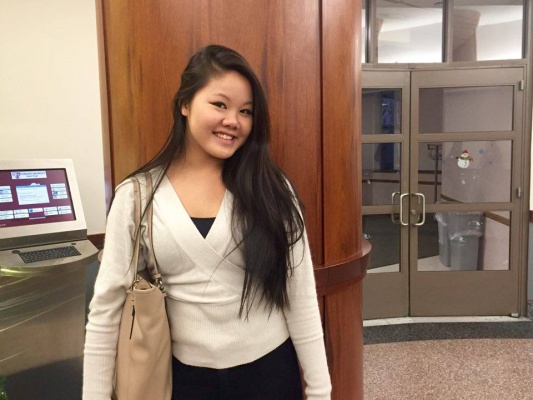APAC Holds Open Discussion on Asian-Americans
Pictured here, Nopell Wong, FCLC ’18, president of APAC, who led the discussion on Asian-American stereotypes. (ANA FOTA/THE OBSERVER)
December 11, 2015
The Asian Pacific American Coalition (APAC), a Fordham Lincoln Center club, held an open discussion during their last general meeting of the semester, on Dec. 3. In an email send out to student members about the meeting, the club’s leaders stated, “With all the events that have happened, we felt it would be appropriate to discuss a few controversial issues within the Asian community.” She was referencing all the bias incidents that occurred this semester.
When talking about past meetings, Nopell Wong, Fordham College at Lincoln Center (FCLC) ’18 and President of APAC, said, “[The club] is not just about food anymore.” Wong is looking to make changes to the APAC agenda, she said, “there are so many issues we should be discussing in light of what happened last month, that we should be discussing as a cultural club; we’re obligated to do that.”
The e-board, Wong included, intends to center the discussions for next semester around media covering different issues faced by the Asian American community. Their hope is that by presenting specific topics to focus on, such as gender relations, race, and a stronger dialogue about stereotyping, a space of discussion will be created not only within the coalition, but in collaboration with other cultural clubs as well.
At the meeting, Wong and APAC Vice President, Jeanne Nina Laurel (FCLC) ‘18, led the discussion in response to an article published by the New York Times’ Nicholas Kristof, entitled “The Asian Advantage.” Using such terms as the “Asian F” and citing Confucian values, Kristof worked to try and disentangle the stereotypes surrounding Asian excellence in schools and in the math and science fields.
“I think Kristof wrote with good intentions,” Laurel said, but “it is one thing to research facts and another to talk to people.” The group’s reaction seemed to be in agreement, students finding particular issues with Kristof’s line, “Some disagree, but I’m pretty sure that one factor [of their success in the US] is East Asia’s long Confucian emphasis on education.” With a quick show of hands, it was found that none of those present were particularly aware of Confucian values, or able to identify them in their own lives.
Wong continued to encourage those present “to get angry” as discussion turned to the academic and stereotype-driven expectations that Asian-American students are held to, talking about how their hard-work is trivialized, their good grades labelled as a product of their race. Addressing the room at large, Wong reassured, “No, no, no, we work hard for this.” The statement was well accepted, with students expressing exasperation in regards to the pressure of the stereotypes that have been carried by Asian-American students during their academic careers.
Wong later commented that, the LC campus is “the most diverse environment some people have ever been in,” continuing on to say that having a club like APAC a platform that should not be taken lightly or wasted. In order to make the most of their platform, the next semester of APAC meetings will be article-based conversations about issues faced by Asian-Americans, leading up to a larger intersectional discourse about race at the end of the year.










